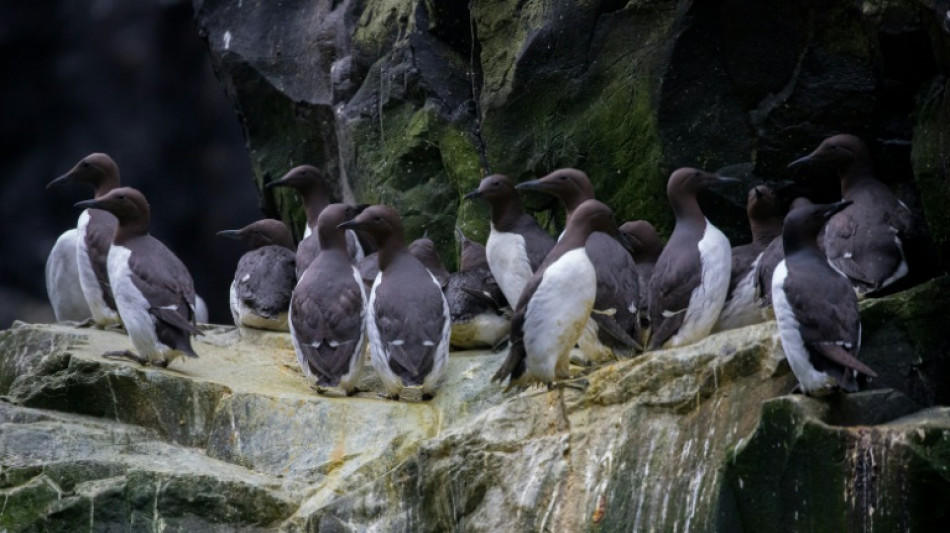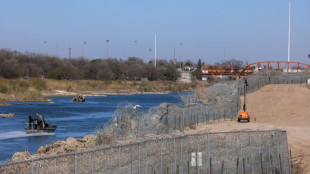
-
 Brazil binman finds newborn baby on garbage route
Brazil binman finds newborn baby on garbage route
-
US senator smashes record with marathon anti-Trump speech

-
 Trump advisor Waltz faces new pressure over Gmail usage
Trump advisor Waltz faces new pressure over Gmail usage
-
Niger junta frees ministers of overthrown government

-
 Trump set to unleash 'Liberation Day' tariffs
Trump set to unleash 'Liberation Day' tariffs
-
Boeing chief to acknowledge 'serious missteps' at US Senate hearing

-
 Real Madrid hold Real Sociedad in eight-goal thriller to reach Copa del Rey final
Real Madrid hold Real Sociedad in eight-goal thriller to reach Copa del Rey final
-
Nuno salutes 'special' Elanga after stunning strike fires Forest

-
 PSG survive scare against Dunkerque to reach French Cup final
PSG survive scare against Dunkerque to reach French Cup final
-
Sundowns edge Esperance as crowd violence mars quarter-final

-
 Nottingham Forest beat Man Utd, Saka scores on Arsenal return
Nottingham Forest beat Man Utd, Saka scores on Arsenal return
-
Elanga wonder-goal sinks Man Utd as Forest eye Champions League berth

-
 Stock markets mostly advance ahead of Trump tariffs deadline
Stock markets mostly advance ahead of Trump tariffs deadline
-
US movie theaters urge 45-day 'baseline' before films hit streaming

-
 Saka scores on return as Arsenal beat Fulham
Saka scores on return as Arsenal beat Fulham
-
Third-division Bielefeld shock holders Leverkusen in German Cup

-
 Ball-blasting 'Torpedo bats' making waves across MLB opening weekend
Ball-blasting 'Torpedo bats' making waves across MLB opening weekend
-
Newsmax shares surge more than 2,000% in days after IPO

-
 Thousands of Hungarians protest against Pride ban law
Thousands of Hungarians protest against Pride ban law
-
GM leads first quarter US auto sales as tariffs loom

-
 Tesla sales tumble in Europe in the first quarter
Tesla sales tumble in Europe in the first quarter
-
No 'eye for an eye' approach to US tariffs: Mexico

-
 NFL club owners back dynamic kickoffs, delay tush push vote
NFL club owners back dynamic kickoffs, delay tush push vote
-
Trump 'perfecting' new tariffs as nervous world braces

-
 Trump nominee says to press UK on Israel arms
Trump nominee says to press UK on Israel arms
-
French court says Le Pen appeal ruling could come before presidential vote

-
 The battle to control assets behind Bosnia crisis
The battle to control assets behind Bosnia crisis
-
Prabhsimran powers Punjab to IPL win over Lucknow

-
 Mass layoffs targeting 10,000 jobs hit US health agencies
Mass layoffs targeting 10,000 jobs hit US health agencies
-
Tiger's April Foolishness: plan to play Masters just a joke

-
 Myanmar quake toll passes 2,700, nation halts to honour victims
Myanmar quake toll passes 2,700, nation halts to honour victims
-
Turkish fans, artists urge Muse to cancel Istanbul gig

-
 US seeks death penalty for accused killer of insurance CEO
US seeks death penalty for accused killer of insurance CEO
-
UK govt moves to block sentencing guidelines for minority defendants

-
 Trump puts world on edge as 'Liberation Day' tariffs loom
Trump puts world on edge as 'Liberation Day' tariffs loom
-
Swedish journalist jailed in Turkey kept 'isolated': employer

-
 Stock markets advance ahead of Trump tariffs deadline
Stock markets advance ahead of Trump tariffs deadline
-
Gulf between Everton and Liverpool has never been bigger, says Moyes

-
 Finland to withdraw from anti-personnel mine ban treaty
Finland to withdraw from anti-personnel mine ban treaty
-
UK vows £20 million to boost drone and 'flying taxi' services

-
 Ford's US auto sales dip in first quarter as tariffs loom
Ford's US auto sales dip in first quarter as tariffs loom
-
Digging for box office gold, 'A Minecraft Movie' hits cinemas

-
 Southampton boss Juric desperate to avoid Premier League 'worst team' tag
Southampton boss Juric desperate to avoid Premier League 'worst team' tag
-
Thailand rescue dogs double as emotional support

-
 Five takeaways from Marine Le Pen verdict
Five takeaways from Marine Le Pen verdict
-
Stock markets split ahead of Trump tariffs deadline

-
 Turkish fans, artists urge Muse to cancel Istanbul gig over protest dispute
Turkish fans, artists urge Muse to cancel Istanbul gig over protest dispute
-
Former captain Edwards named new England women's cricket coach

-
 Haaland ruled out for up to seven weeks: Man City boss Guardiola
Haaland ruled out for up to seven weeks: Man City boss Guardiola
-
UK Supreme Court opens car loans hearing as banks risk huge bill


Single heat wave wiped out millions of Alaska's dominant seabird
The common murre, a large black-and-white seabird native to northern waters, has become far less common in Alaska over the past decade due to the impacts of climate change.
A study published Thursday in Science reveals that a record-breaking marine heat wave in the northeast Pacific from 2014 to 2016 triggered a catastrophic population collapse, wiping out four million birds -- about half the species in the region.
Strikingly, they have shown little signs of rebounding, suggesting long-term shifts in the food web that have locked the ecosystem into a troubling new equilibrium.
"There's a lot of talk about declines of species that are tied to changes in temperature, but in this case, it was not a long term result," lead author Heather Renner of the Alaska Maritime National Wildlife Refuge told AFP.
"To our knowledge, this is the largest mortality event of any wildlife species reported during the modern era," she and her colleagues emphasized in their paper.
The finding triggers "alarm bells," Renner said in an interview, as human-caused climate change makes heat waves more frequent, intense, and longer-lasting.
- Emaciated Carcasses -
With their dapper, tuxedoed look, common murres are sometimes called the "penguins of the north."
Their slender wings power them across vast distances in search of food and make them expert divers. But even these hardy seabirds were no match for an unprecedented environmental catastrophe.
The largest marine heat wave ever recorded began in the late fall of 2014, spanning a massive swath of the northeast Pacific Ocean from California to Alaska.
It persisted for over two years, leaving devastation in its wake. During this time, some 62,000 emaciated murres washed ashore along the North American Pacific coastline -- dead or dying from starvation.
Experts point to two key reasons for the bird deaths: elevated ocean temperatures reduced both the quality and quantity of phytoplankton, impacting fish like herring, sardines, and anchovies -- the mainstay of the murre diet.
At the same time, warmer waters increased the energy demands of larger fish, such as salmon and Pacific cod, which compete with murres for the same prey.
"We knew then it was a big deal, but unfortunately, we couldn't really quantify the effects," explained Renner.
For years after the event, breeding colonies failed to produce chicks, complicating efforts to assess the full impact.
Earlier estimates pegged the number of deaths at around a million, but a more robust analysis -- drawing on data from 13 murre colonies -- revealed the toll was four times higher.
"It is just so much worse than we thought it was," Renner said of the new findings.
- Climate winners and losers -
The marine heat wave didn't just impact common murres. Pacific cod stocks collapsed, king salmon populations dwindled, and as many as 7,000 humpback whales perished.
Yet the crisis created an uneven playing field: some species emerged unscathed, while others even thrived.
Thick-billed murres, which often share nesting cliffs with common murres, were largely unaffected, possibly due to their more adaptable diet, Renner noted.
For common murres, however, the fallout lingers. Despite nearly a decade since the heat wave, their numbers show no sign of bouncing back -- and the losses may well be permanent.
Part of the reason lies in the long-term decline of some of their prey.
Another factor is murres' survival strategy relies on numbers: they aggregate in massive colonies to protect their eggs from opportunistic predators like eagles and gulls.
With their populations slashed, these birds have lost their critical safety buffer.
Still, Renner offered a glimmer of hope.
While addressing global warming is essential for curbing long-term climate change, conservation efforts can make a difference in the short term, she said.
Removing invasive species like foxes and rats from murre nesting islands could also provide the beleaguered birds with a fighting chance.
O.Norris--AMWN



